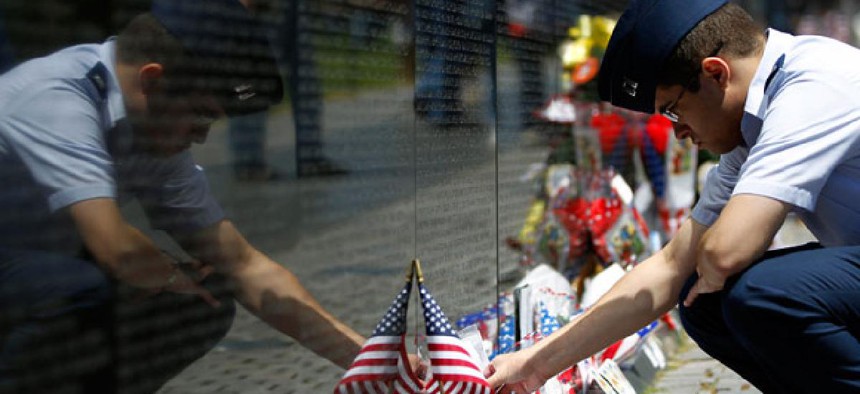Analysis: How We Could Do More for Our Vets
We need to go into debt to pay our debt to U.S. veterans.
I spent several hours on Memorial Day at the Vietnam Veterans Memorial wall. There is nothing notable or exceptional about my presence. I was too young to serve, and no name close to me is there for the etching, tears, or swollen sense of loss. Two cousins of mine (their sense of modesty seeks anonymity) served and came home alive and whole. One served two tours in Vietnam—the second as an artillery officer. He remained in the Army as part of the generation of junior officers who dedicated their post-Vietnam careers to improving the tattered, demoralized, and generally ill-disciplined fighting force that emerged from Southeast Asia. He retired as a colonel after tours in Germany and South Korea, among other places, and several years as an artillery instructor at what is now Joint Base Lewis-McCord.
My cousin suffers from Parkinson's and has for almost 20 years. His care, of course, is covered, and the costs rise as his condition deteriorates. It's a slow decline, as anyone who has witnessed Parkinson's can attest. But my cousin is as brave and heroic to me as he was when I was a child. Back then, I helped my mother tape water-tight (or so we hoped) care packages headed for impossibly distant Vietnam. I thought about my cousins at the wall. I thought about their needs and how, in the main, they are being met.
I also thought about how many times at sporting events I have risen in unison with the crowd to applaud post-9/11 war veterans given seats of honor. I remembered how we didn't do that for my cousins or any of their war-torn Vietnam comrades. You might imagine that made me feel better about our times. It did not. I began to wonder if there wasn't something transparently easy and indulgently comforting about a round of applause at a sporting event. Maybe the applause allows us to feel better—gives us the satisfying sense we are doing right by our veterans. I don't oppose the gesture, and I want it to continue. But I wonder if our veterans deserve something more—something enduring and attentive to needs that last long after the final score is posted and the hearty applause fades away.
That led me to ponder these inescapable facts. According to the Census Bureau, there are 2.5 million 9/11-era veterans. Their rate of service-connected disability is 26.7 percent—far higher than the 20.2 percent rate for the 7.5 million Vietnam-era veterans. The reality is most veterans of the Iraq and Afghanistan wars, despite being deployed multiple times, have returned and will return alive. In the Korean War, 2 percent of combat veterans died. In Vietnam, it was 1.7 percent. In Iraq and Afghanistan, it is currently 0.3 percent. This is the result of professional training, precise mission execution, and breath-taking advances in battlefield medicine. For this, we can be grateful. But we also must do more than applaud.
As I have seen with my cousin, the costs of war cast a long shadow. The shadow for Iraq and Afghanistan vets with artificial limbs and traumatic brain injury are already ever-present. The cost of caring for these veterans now is growing every year and will keep growing over time. In 2010, the House Veterans' Affairs Committee predicted $1.3 trillion in lifetime medical costs for post-9/11 veterans. Those estimates imagined between 30,000 and 60,000 troops in Iraq or Afghanistan through 2020. The Iraq war is over and Afghanistan is winding down. Those cost projections may be too high, but $1 trillion in future expenditures is not unrealistic.
And it's not just a question of cost. It's one of service. According to the most recent estimates, there are 800,000 pending disability claims at the Veterans Administration, and hundreds of thousands have been in process for at least four months. Some claims can take up to a year to process. Jon Stewart of "The Daily Show" raised this issue, as only he can, seriously and satirically. There is some progress. From March to May, the four-month-or-longer backlog fell by 8 percent to just over 538,000. That's still a scandal. Worse still, the administration's goal is to reduce wait times to no-more-than-four-months by 2015.
Combat veterans need better service, and they need it now. Their lives wither while they wait for the bureaucracy to process payments for that which they lost on the battlefield. Annual increases in appropriations won't do the trick. Combined annual spending on veterans' care is now more than $140 billion. That figure is up 41 percent from 2009—and we're still way, way behind. Combat veterans deserve better. What to do?
Go into debt.
Yes. Go into debt. There are three principle needs combat veterans have that we as a nation are obliged to finance or at least promote: health care, housing, and life-long counseling. All are expensive, but they are vital to any combat veteran's successful reentry into civilian life. If we imagine $1 trillion in health care costs alone, we better imagine a future where we are willing to pay. Will that future exist after the Afghanistan war is over? Will we still be applauding 9/11-era veterans in 2016? I don't know. But I have my doubts. The time to fund these known and knowable costs is now.
With debt.
I propose $1 trillion in a debt-financed trust fund for health care, counseling, and housing. These are basic needs, and with the absolute guarantee of funding, the VA can offer two choices: stay in the existing disability system or receive as-needed funding for immediate needs in these three areas. Does anyone doubt that ready cash would allow combat veterans to re-enter civilian life with less financial stress, hardship, and needless waiting?
As for the "cost" of debt, it's never been lower. And it's unlikely ever to be as inexpensive as it is now. According to Treasury Department figures, we spent $359 billion servicing our $16.06 trillion debt last year. That is the lowest amount devoted to interest payments on the national debt since 2005. We spent $352 billion that year … on a national debt of $7.93 trillion.
I'm not advocating debt for roads or railroads or tax cuts or—dare I say it?—wars. I'm advocating debt for costs we know are real and that we know will grow to provide immediate financial lifelines to combat veterans we are now sentencing to unconscionable wait times for disability claims and other services.
In his Memorial Day remarks at Arlington National Cemetery, Obama said this about how little the hardships of military life and war-fighting touch the average American: "Today, most Americans are not directly touched by war. As a consequence, not all Americans may always see or fully grasp the depth of sacrifice, the profound costs that are made in our name."
I propose paying those costs up front. Now. With debt. Debt that's inexpensive and that can render real and permanent benefits to those who deserve it most. We can sort out the details of who qualifies and for how much. That is easy compared with summoning the political will now to acknowledge the costs, admit the politics of paying them will only become more precarious in the years ahead, and biting the debt bullet now.
The debt that is owed is real. We can and should repay it—starting now.
And here's the bumper sticker: Debt to Vets, Debt for Vets.
This article appears in the May 29, 2013, edition of National Journal Daily.




